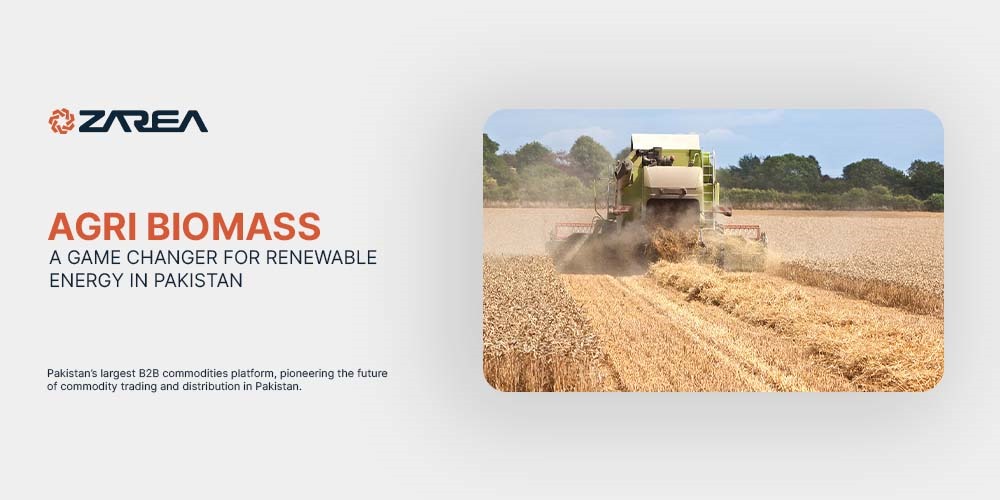Agri Biomass – A Renewable Energy in Pakistan:
Pakistan is facing an energy crisis characterized by a growing need for sustainable and renewable energy sources. Among the various alternatives, agricultural biomass has emerged as a crucial element in the country’s renewable energy sector. Agricultural biomass refers to organic materials derived from agricultural byproducts, such as crop residues, husks, and animal waste. With Pakistan’s vast agricultural landscape, biomass offers a rich and eco-friendly energy solution that can reduce reliance on fossil fuels and enhance energy security.
Zarea is the biggest B2B commodities platform in Pakistan, leading the way for renewable energy’s future in the country.
Understanding Agri Biomass:
Farmers produce agricultural biomass from organic waste products generated by their farming operations. Among the most prevalent sources in Pakistan are:
- Agricultural Residues: Wheat straw, rice husks, corn stalks, and sugarcane pulp.
- Animal Excrement: Farm animals produce feces and manure, which can be transformed into biogas.
- Agro-Industrial Waste: Byproducts from food processing sectors, including fruit skins and molasses.
- Forestry Byproducts: Wood shavings and chips generated during timber manufacturing.
Benefits of Agri Biomass in Pakistan:
Sustainable and Renewable Energy Source
In contrast to fossil fuels, agriculture can regenerate biomass, making it a renewable asset and a sustainable energy option.
Decrease in Energy Deficits
Pakistan experiences regular power cuts because of energy deficits. Using agricultural biomass can assist in closing the energy gap by offering a decentralized and readily accessible power supply.
Advantages for the Environment
- Reduced Carbon Emissions: Biomass energy produces considerably lower CO₂ levels than coal and oil.
- Waste Minimization: Agricultural waste, typically incinerated or thrown away, is used effectively.
- Enhanced Air Quality: Minimizing the open burning of agricultural residues lowers air pollution levels.
Economic Expansion and Countryside Advancement
- Employment Generation: Biomass energy initiatives create job prospects for rural areas.
- Farmers’ Earnings: Marketing agricultural waste as biomass fuel offers an extra source of income.
- Energy Independence: Decreasing dependence on foreign fuels bolsters Pakistan’s economy.
Applications of Agri Biomass in Energy Production:
Biogas Production
Biogas facilities can treat animal manure and organic waste to generate methane-dense gas for electricity and cooking purposes. Extensive biogas initiatives can aid industries and provide electricity in rural areas.
Power Plants Utilizing Biomass
Biomass power plants may incinerate crop residues to produce electricity. Burning biomass alongside coal in thermal plants can lower carbon emissions.
Biofuels and Bioethanol
We can transform bagasse from sugarcane and molasses into bioethanol, acting as a substitute for gasoline. Biodiesel made from vegetable oils can fuel vehicles and farming equipment.
Pellets and Briquettes for Heating Purposes
Farmers can form agricultural waste into pellets or briquettes, which serve as fuel for cooking and heating in homes and industries.
Challenges and Potential Solutions:
Insufficient Awareness and Infrastructure
Answer: Investments from the government and private sector in biomass facilities and training initiatives can improve adoption.
Seasonal Presence of Biomass
Answer: Creating adequate storage facilities can guarantee a continuous supply of biomass resources throughout the year.
Upfront Expenditure Expenses
Answer: Financial rewards, grants, and collaborations between the public and private sectors can aid biomass energy initiatives.
Government Initiatives and Future Outlook:
The government of Pakistan is promoting renewable energy through the establishment of policies that support biomass projects. The Alternative Energy Development Board (AEDB), in collaboration with several organizations, is working to develop biomass power plants and biogas facilities throughout the nation. With increasing investments and advancements in technology, agricultural biomass has the potential to make a substantial impact on the country’s energy mix.
Final Thoughts:
Agri biomass offers a transformative opportunity for the renewable energy sector in Pakistan. Its abundance, sustainability, and economic benefits make it a superior alternative to conventional energy sources. By harnessing biomass energy effectively, Pakistan can address its energy challenges, reduce environmental pollution, and promote economic development in rural communities. To fully unlock the potential of biomass energy in Pakistan, support from the government, advancements in technology, and active participation from the private sector are crucial.
FAQ’s:
What is agri biomass?
Organic materials such as trees, plants, and waste originating from agricultural and urban environments derive biomass. The majority of biomass produced by agriculture in the European Union is in the form of biogas, in addition to raw materials used for the production of biodiesel and bioethanol.
What are the four 4 types of biomass?
At present, we employ four types of biomass: wood and agricultural products, solid waste, landfill gas, and biogas, in addition to alcohol fuels like ethanol and biodiesel. The predominant source of biomass energy currently comes from residential production. Wood, including logs, chips, bark, and sawdust, accounts for approximately 44 percent of the biomass energy utilized.
What is called biomass?
Researchers define biomass as renewable organic materials obtained from both flora and fauna. People can use it directly for producing heat or convert it into liquid and gaseous fuels through various methods. Until the mid-1800s, biomass was the main contributor to the total annual energy consumption in the United States.
What does renewable energy mean?
Renewable energy is derived from natural resources that are replenished more quickly than they are consumed. For example, sunlight and wind are continuously available sources. These renewable energy resources are plentiful and found in various locations.
What are 5 advantages of renewable energy?
Developing energy solutions that produce no greenhouse gas emissions from fossil fuels while reducing specific forms of air pollution. Diversifying energy sources and reducing dependence on imported fuels. Fostering economic growth and job creation in manufacturing, installation, and related sectors.

































